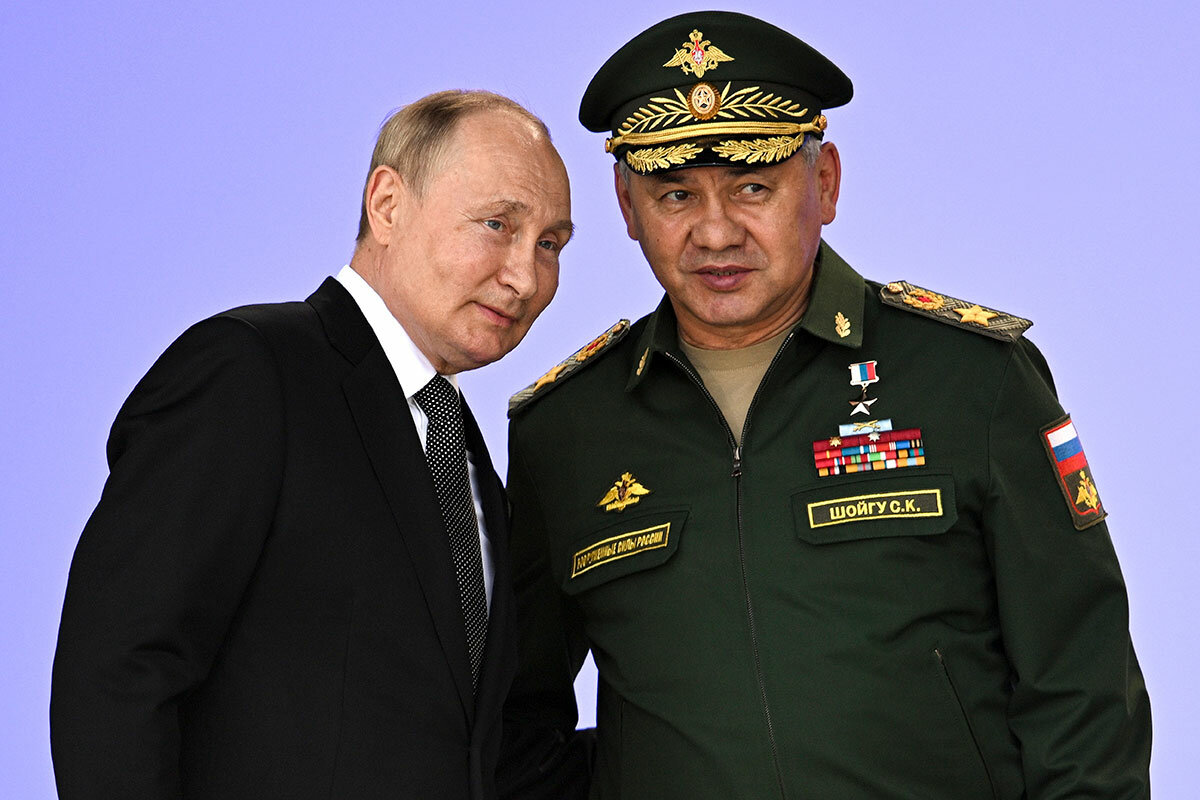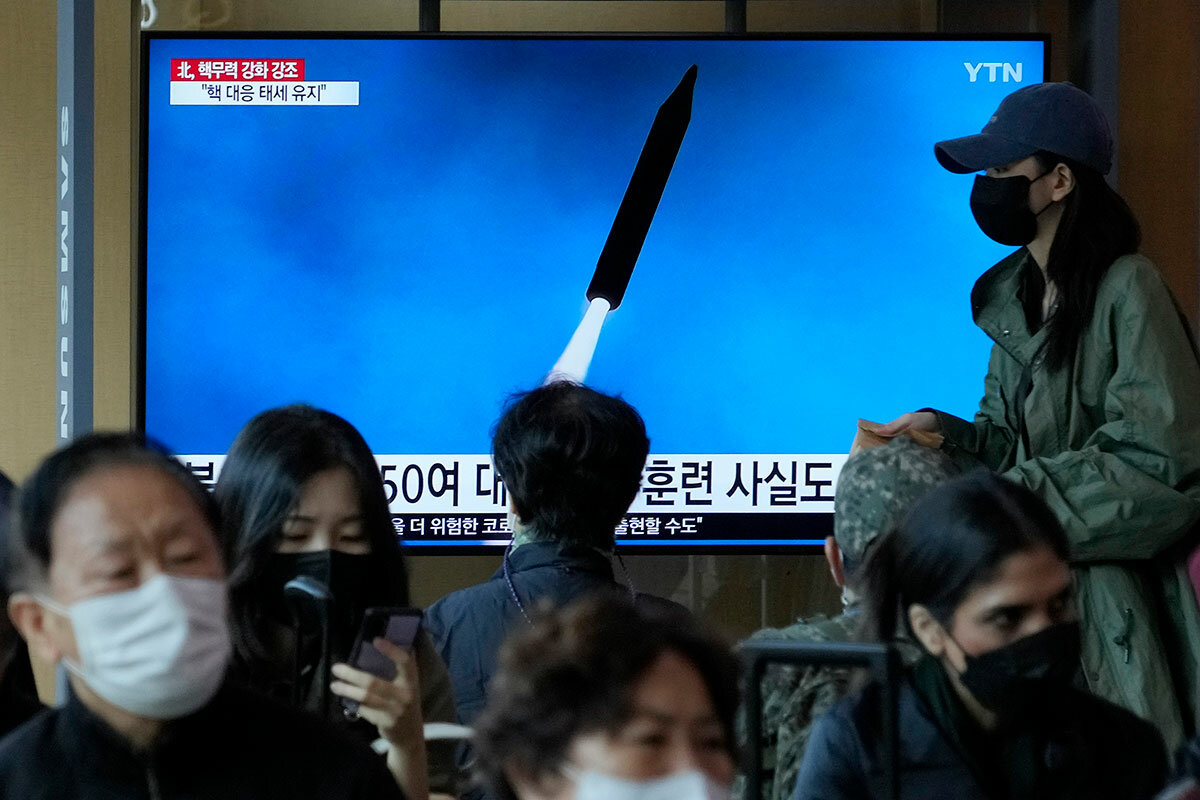All that nuclear talk: Is the unthinkable suddenly possible?
Loading...
| Washington
First, Vladimir Putin raised the prospect of using nuclear weapons to further his aims in the war in Ukraine.
Then North Korea’s Kim Jong Un followed suit, announcing his field inspection of tactical nuclear weapons units. That seemed to confirm a change in nuclear weapons strategy Mr. Kim had hinted at earlier this year – from “no first use” to foreseeing the use of battlefield tactical nuclear weapons.
To many experts, the sudden crescendo in talk of nuclear weapons suggests an epochal shift in perception of the use of nuclear arms from unthinkable – remember Ronald Reagan and Mikhail Gorbachev declaring in 1985 that “a nuclear war cannot be won and must never be fought” – to possible.
Why We Wrote This
Since the bombing of Nagasaki, the world has resolutely avoided the use of nuclear weapons. How can that proscription be preserved amid current world tensions?
“We are on the cusp of a third nuclear age that puts us in uncharted waters,” says David Cooper, a senior fellow at the Center for Strategic and Budgetary Assessments in Washington and a former director of nonproliferation policy at the Pentagon.
After the Cold War era of nuclear competition between two superpowers, and then the post-Cold-War years of rising nuclear threats from regional powers, the world is back to great-power nuclear competition – with China added to the mix this time around, Dr. Cooper says.
Also dangerously characteristic of this third era: vanishing international cooperation on nuclear disarmament, and the destabilizing weakness of one of the nuclear powers, Russia.
Mr. Putin’s threats suggest that this new era has the potential for a creeping normalization of nuclear weapons’ use, some experts say – and for increased recourse to nuclear blackmail by countries like Russia (or North Korea) facing adversaries with significant conventional military advantages.
Moreover, the burgeoning public discussion of nuclear arms use and behind-closed-doors plotting of their place in battlefield scenarios suggest to others that the use of nuclear weapons is no longer necessarily seen as a moral issue.
“We have had this idea of a moral taboo” on using nuclear weapons, Dr. Cooper says. Under what he calls the “optimistic scenario” for today, that taboo is still operative, he says.
But “if the genie is out,” he adds, “we are back in a very dangerous nuclear landscape.”
A nuclear game changer
Yet despite these disquieting trends, the eight-decade-long proscription against nuclear weapons use has not been breached. While that offers hope, some say, it also adds urgency to diplomatic efforts to convince Mr. Putin and others not to cross the line.
President Putin “is not the only nuclear bully on the playground,” says Heather Williams, a nuclear weapons experts at the Center for Strategic and International Studies in Washington.
“Nonetheless it is Putin who is leading the way in threatening to break a taboo that has held for 77 years. What has not changed is that any nuclear use is a game changer and has strategic consequences,” she adds. “That is the reality the U.S. and NATO and the West have to continue to message to Putin and anyone else,” such as North Korea and Iran.
The creeping normalization of the use of low-yield or so-called tactical nuclear weapons – even if still only rhetorical – results from a number of factors, nuclear arms experts say. They include nuclear superpowers’ retreat from landmark arms control treaties and nuclear diplomacy, the unchecked proliferation of nukes in North Korea, and a shift among some military planners toward thinking of tactical nuclear explosives as a shock weapon useful to an “escalate to de-escalate” strategy.
Tactical nuclear weapons are smaller devices that can be fitted on shorter-range missiles, or even fired from the back of a pickup truck, deployed to annihilate an advancing military unit, for example, or destroy a few city blocks (rather than entire cities, targets for strategic nuclear weapons). Such weapons would still entail the threat of drifting radioactive clouds and long-term environmental impacts.
Another reason that Mr. Putin is threatening to use nuclear weapons may simply be that the Ukraine war has put on display the Russian military’s failures in conducting conventional warfare and its lack of high-tech, state-of-the-art weaponry, some say.
“When you are Russia, or for that matter when you are North Korea, your ability to fight the new generation of warfare … does not compare to South Korea, the U.S., or NATO,” says Henry Sokolski, executive director of the Nonproliferation Policy Education Center in Arlington, Virginia.
“And so what do you do? You jump to what you can do, which is to threaten using nuclear weaponry to achieve your objectives,” he says.
From battlefield nuke to mushroom cloud?
That would take the world into unknown territory, and new ways of using nuclear weapons. For decades, a hallmark of major powers’ nuclear policy has been deterrence. Now, Mr. Putin is using nukes as a tool of “coercion” to prompt desired responses from others, says Dr. Cooper, whose most recent book is “Arms Control for the Third Nuclear Age.”
The Russian president, he says, is warning the West that although “right now I’m sticking to lower-level stuff in Ukraine … you’d better not try to stop me or this will go to a nuclear level.”
“He’s betting he can backstop his conventional [warfare] problems in Ukraine with the nuclear threat, and he may be right,” Dr. Cooper adds. “We’re clearly in uncharted waters where our deterrence capabilities are significantly challenged.”
If Mr. Putin’s nuclear gambit were to succeed, a “normalization” of smaller tactical nuclear weapons would be “probable,” Dr. Cooper says, and could lead to nuclear proliferation worldwide.
That would be an alarming jolt after three decades of post-Cold War complacency encouraged by declining fears that big-power nuclear confrontation could subject the world to a fearsome “nuclear winter.”
“Nuclear weapons never went away; the public just forgot about them,” says Dr. Williams. “And then in the past we associated the nuclear threat with the big mushroom cloud and the devastating bombings of Hiroshima and Nagasaki. What Putin is talking about,” she adds, “are lower-yield tactical weapons that would likely be used on the battlefield.”
Even so, she says, the world needs to understand that their use would very likely entail the kind of broader “strategic consequences” that could lead to that mushroom cloud.










